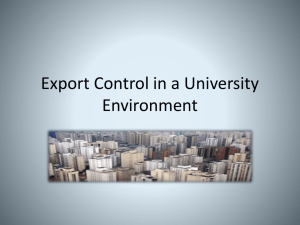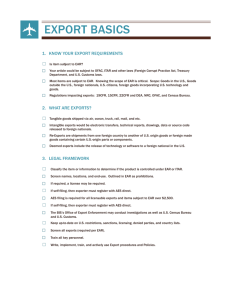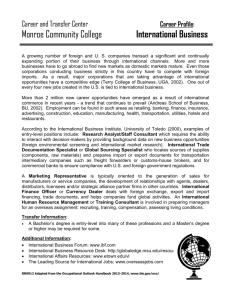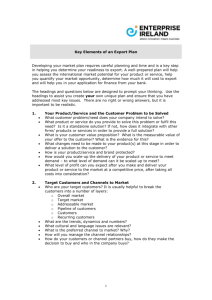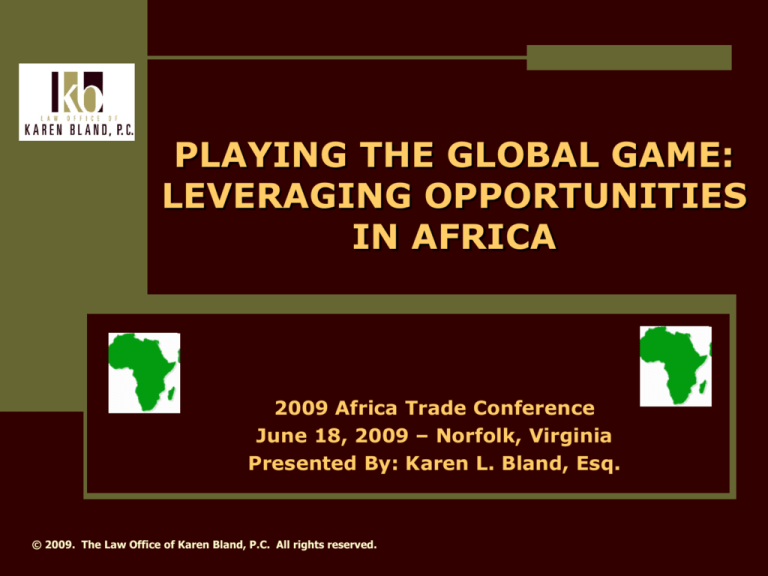
PLAYING THE GLOBAL GAME:
LEVERAGING OPPORTUNITIES
IN AFRICA
2009 Africa Trade Conference
June 18, 2009 – Norfolk, Virginia
Presented By: Karen L. Bland, Esq.
© 2009. The Law Office of Karen Bland, P.C. All rights reserved.
Is This You?
FRUSTRATED
CONFUSED
OVERWHELMED
This Could Be You
“The World’s Your Playing Field . . . .
Make Sure You
Know the Rules”
REAPING MORE SALES,
MORE REVENUE, MORE PROFITS !!
Our Journey Today
Doing Business in this Global
Economy
Know the Rules to Play the
Game
Developing Your Game
Strategy
Finding Coaches
Doing Business in
this Global Economy
A “Flatter” World
More Open Markets
Strong Demand for “Made in
the U.S.A”
Size Is Not A Constraint
Technology Used for “Evil”
GREAT OPPORTUNITIES – GREATER RISKS
Know The Rules to
Play the Game
U.S. Law
Export licensing
Restrictions on
where, to whom
Foreign Corrupt
Practices Act
Import compliance
International Law
Foreign Laws and
Regulations
Import Tariffs,
Fees,
Documentation
IP Protection
Abroad
Do I Need An Export
License? . . . MAYBE
Two Major U.S. Export Licensing Regimes
Export Administration Regulations
(EAR)
Commerce Dept. (Bureau of Industry and Security)
International Traffic in Arms
Regulations (ITAR)
State Dept. (Directorate of Defense Trade Controls)
Getting Started – 4 Main
Questions
What do we export?
Where is it going?
Who is it going to?
What will it be used for?
ANSWERS TO THESE QUESTIONS INDICATE
WHETHER SUBJECT TO EXPORT LICENSING
What Is An Export
(for licensing purposes)?
Any transfer of a controlled product,
software, technology, or service to a
foreign national, regardless where
located . . . .
Need not be a sales transaction
Implications For
Use of foreign distributors/re-sellers
Hiring foreign national employees
E-commerce
Trade shows and demonstrations
Emailing operational instructions to
overseas customers
What Do We Export?
Export Administration Regulations (EAR)
Dual-use: commercial and military
applications
“Items” – commodities, technology,
software
Export Classification Control
Number (ECCN) on the Commerce
Control List (CCL)
EAR 99 for most (but not all) products
What Do We Export?
Int’l Traffic in Arms Regulations (ITAR)
Defense goods and services: military
applications
Includes technical
assistance, training
U.S. Munitions List - categories
Types of Products Subject
to Licensing
Dual-Use (EAR)
Defense (ITAR)
Certain aircraft parts &
components
Computers
Information technology
software
Certain chemicals
Fiber optic cables
Certain bacteria and viruses
Roller ball bearings
Certain electronic components
& materials
Software containing encryption
Wind tunnel technology
Certain crime detection
equipment & technology
Certain machine tools
Certain lasers
Certain imaging devices
Firearms and weapons
Missiles, rockets, bombs
Explosives and propellants
Warfare vessels and naval
equipment
Aircraft & equipment
Military training & equipment
Military electronics
Biological agents
Spacecraft systems &
equipment
Nuclear weapons
Miscellaneous – other articles
with military application
Where Is It Going?
Export Administration Regulations (EAR)
Country Groups
Group A – Regime Members
Group B – Less Restricted - includes
The Gambia, Ghana, Malawi,
Morocco
Group D – Countries of Concern
Group E – Terrorist Supporting
Where Is It Going?
Int’l Traffic in Arms Regulations (ITAR)
NATO Members, Australia, Japan –
consideration for comprehensive
authorizations
Australia, UK – expedited license
processing
Rwanda, Congo, Libya – policy of
denials, with limited exceptions
Who Is It Going To?
Beware Of The “Bad Guys”
Lists to Check - Specially Designated
Nationals, Denied Parties, Entity List,
Debarred List, Nonproliferation Sanctions
Treasury (OFAC) Restrictions
Restrictions on trade and financial
transactions
Countries (Cuba, North Korea),
Individuals (terrorists, drug traffickers),
Entities (orgs linked with terrorist orgs)
Know Your Customer
Due diligence on every export transaction
No exception for e-commerce sales
What Will It Be Used For?
Prohibited End-Uses
Chemicals and biological weapons
Nuclear non-proliferation
Weapons of mass
destruction
Anti-terrorism
National security concerns
EXPORTERS ARE OBLIGATED TO SAFEGUARD
AGAINST PROHIBITED END-USES
Practical Considerations
Most U.S. Exports Are NOT Subject to
Licensing
Only about 10% of U.S. exported goods require
EAR license
License Exceptions under EAR and ITAR
EAR – Country Group B, civil end-users,
temporary exports (trade shows)
ITAR – Export to U.S. govt. agency overseas,
temporary, Canada
“Bad Guy” Lists Are Publicly Available
Commerce, Treasury, State websites; email
notification of updates
Why Should You Care?
Loss of export privileges
Debarment from U.S. government
contracting
Tough Penalties
Administrative - Up to $50,000 per
violation (EAR)
Civil – Greater of $250,000 OR 2xs value of
transaction
Criminal – Up to $1,000,000 and 20 years
in prison per violation
Adverse Publicity
Real World Example
Individual made deal to export two
Mercedes Benz autos from the U.S.
to Lebanon, where the cars would
then be shipped to Syria.
Cars = EAR 99
Lebanon – Country Group B
Syria – Country Group E
IS THIS AN EXPORT CONTROL VIOLATION??
Other Export Requirements
Product-Specific
Chemicals
Autos (used and new)
Pharmaceuticals
Medical Devices
May Need Certification from
Another U.S. Agency – Required By
Foreign Government
EPA (Environmental Protection Agency)
Food and Drug Administration (FDA)
Customs & Border Protection (CBP)
Money Talks, Can I Use It?
NO!!
U.S. anti-bribery law: Foreign
Corrupt Practices Act (FCPA)
Limited Affirmative Defenses
Forbids payments to foreign officials for
obtaining/keeping business
Payment is lawful under foreign country’s laws or
made to demonstrate a product or its performance
Size is NOT a defense
Flipping the Coin –
Importing From Africa
How Much Does It Cost?
How To Move Goods Across
the U.S. Border?
Special Considerations?
How Much Does It Cost To
Import? Depends . . .
Classification and Valuation
HTS # - Harmonized Tariff Schedule
Duty rate vs. duty-free entry
Processing and/or Handling Fees
If customs must process upon entry – mail entries
Additional fees – storage, handling, etc.
Use of customs broker/express courier
Billed for services to “clear the entry”
No Exception for Internet Purchases
(other than downloads)
How To Move Goods Across
the U.S. Border?
Required Information for “Entry”
Payment of duties, charges, bond
Include seller’s info, description of
merchandise, purchase price, country of origin
(not necessarily where purchased)
Payment of charges/bond for release of
merchandise into U.S. commerce
Product-specific entry requirements
Other agency requirements – FDA, EPA, ATF,
etc.
IMPORTER’S RESPONSIBILITY
LIABLE FOR INACCURACIES
Special Considerations
Quotas
Trade Benefits Programs
Textile and apparel
AGOA (African Growth and Opportunity
Act)
GSP (Generalized System of Preferences)
Unfair trade actions
Is the imported merchandise subject to
antidumping/countervailing duties?
Importing – Practical
Considerations
Understand requirements before
importing merchandise
Structuring terms of sale with
supplier is important
Do Your Homework!
Who will be importer of record?
Guidance/assistance is available
from third parties
Customs brokers, express carriers,
banker, consultants
Rules of the Game - Recap
Exporting
Foreign Corrupt Practices Act
Licensing, Who You Do Business With
How You Conduct Yourself in Winning
Global Sales Contracts
Importing
Requirements to “Clear” Merchandise
through U.S. Customs
HOW YOU NAVIGATE THROUGH THIS WEB OF
U.S. LAWS AND REGULATIONS DETERMINES WHETHER
YOU WIN OR LOSE IN THE GLOBAL BUSINESS GAME!!
Int’l Legal Considerations
Climate in the Overseas Market
Costs of Doing
Business Overseas
Protection of Intellectual
Property Rights
How “Open” Is the Target
Market?
Member of the World Trade Organization?
Investment Climate
The Gambia, Ghana, Malawi, Morocco = YES
Foreign ownership, other restrictions?
Featured countries all have open investment
structures
Special Treaty with the U.S.?
Free Trade Agreement (FTA) - Morocco
Bilateral Investment Treaty (BIT) – Morocco,
Ghana (proposed)
Trade and Investment Framework Agreement
(TIFA) with COMESA (includes Malawi)
How “Open” Is the Target
Market?
Transparency in rule-making
Technical regulations
Does the government publish regulations,
provide advanced notice with opportunity to
comment?
Consumer health and safety, environmental
concerns
Labeling and marking requirements: Arabic
labeling in Morocco
Import licensing on certain goods
Phytosanitary regulations
Standards/restrictions on imported food and
agricultural products
How “Open” Is the Target
Market?
Local Agents/Distributors
Joint Ventures/Licensing
How easy/difficult to find?
Does National Law dictate terms?
Local ownership mandates?
Free negotiation of licensing relationships
Dispute Settlement
System for settling commercial disputes
Is the country a member of international
dispute settlement system? ICSID
What Are The Costs of
Exporting My Product?
Import Tariffs, Fees and Charges
Tariffs applied by the importing country
Free Trade Agreement with the U.S. does not
necessarily mean duty-free entry
Fees, charges applied by the foreign country’s
customs agency to clear merchandise
Documentary/Testing
Requirements
Consular invoices, certificates of inspection
Conformity assessments by third parties
Is My U.S. Trademark/Patent
Protected? Not Necessarily
Int’l Protection of IP Rights
Territorial protection only (except
copyrights)
International filing systems
Trademarks: Madrid Protocol (Ghana,
Morocco)
Patents: Paris Convention, Patent
Cooperation Treaty
Regional systems: African Regional
Intellectual Property Organization
(the Gambia, Ghana, Malawi)
Developing Your Game
Strategy – Play To Win!!
1. Formulate Your Game Plan
Are you export/import-ready?
Where are your strengths or
weaknesses?
Do you have sufficient capital?
IP considerations?
How to fill identified gaps?
A WRITTEN EXPORT/IMPORT
MARKETING PLAN
IS IMPERATIVE
Developing Your Game
Strategy – Play To Win!!
Know The Rules
2.
Do you need a U.S. export license?
Are there other U.S. export
requirements?
What are the U.S. import
requirements?
What rules apply in the target
market?
AVOID PENALTIES, FINES,
AND OTHER COSTLY MISTAKES
Developing Your Game
Strategy – Play To Win!!
3. Build Your Team
Internal – Sales,
Marketing, Compliance
External – Banker
Freight Forwarder
Customs Broker
Trade Attorney/Consultant
EXECUTING YOUR GAME PLAN
IS A TEAM EFFORT
Developing Your Game
Strategy – Play To Win!!
4. Play A Contact Sport
Invest in Trade Missions
Must be prepared to
spend time “on the ground”
in the target market
Personal relationships are
important in global business
BE SENSITIVE TO CULTURAL DIFFERENCES
Finding Coaches
U.S. Department of Commerce
State Int’l Trade Departments
Virginia Econ. Dev. Partnership
USDA
Commercial Service Programs
U.S. Export Assistance Centers
Foreign Agricultural Service
Professional
advisors/consultants
Bankers, trade professionals
Sources For More Info
General Exporting Help
www.export.gov (Commerce) (see Country Commercial
Guides)
www.exportvirginia.org (VEDP)
Export Licensing
www.bis.doc.gov (EAR)
www.pmddtc.state.gov (ITAR)
www.treas.gov/offices/enforcement/ofac (OFAC)
IP Protection
www.stopfakes.gov (international issues)
www.uspto.gov (international registration process)
Sources For More Info
KAREN L. BLAND, ESQ.
(757) 926-5296
kbland@blandlaw.net
THANK YOU!!



